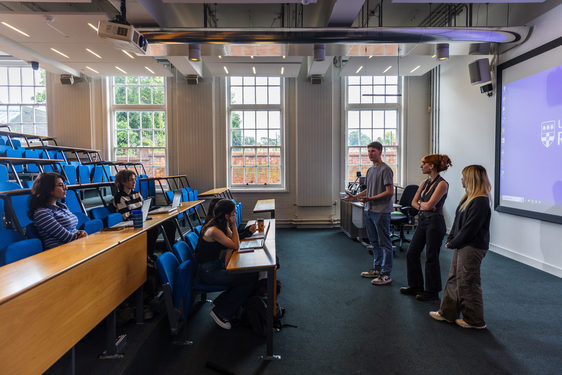
Closing awarding gaps demands a collective commitment that begins with institution-level strategy. Below is an outline of some key ways the University of Reading is supporting local action to reduce gaps.
How is the University of Reading closing its gaps?
The University has progressed several initiatives aimed at closing awarding gaps, which include:
- Developing targets and key performance indicators and integrating them into our governance structure.
- Creating robust evaluation plans for the intervention strategies pertaining to targeted student groups.
- Disseminating awarding gap data to key individuals. The Access and Participation data dashboard is available to Awarding Gap Representatives.
- Providing opportunities for affected students to share experiences and co-create solutions through the Inclusion Consultants and Student Partners schemes.
The full range of activities designed to address outcome gaps are detailed in the Access and Participation Plan (see the visual summary).
The progress and outcomes of University-wide initiatives are regularly reported over on the Evaluation Team’s Evaluation and Reports webpage.
University-wide teaching and learning renewal
The Portfolio Review Pathway (PRP) is a strategic project aimed at evaluating and reimagining the design of the programmes, modules and processes that shape student experience. PRP was developed across 2021-2023, and was rolled out to students in the 2024/25 academic year.
Through PRP, the University aims to address barriers to learning that may disproportionately affect underrepresented groups, by providing:
- clearer and more equitable expectations;
- realistic choice;
- reduced exams;
- effective, engaging assessment that is proportionate and more evenly distributed across programmes, and;
- blended and flexible learning approaches which are truly student centric and inclusive.
All new programmes at the University need to go through an approval process that reflects PRP principles and processes. Below, you can find information on how PRP’s key principles offer practical solutions to possible causes of awarding gaps.
Curriculum
- Module shape and size and student effort (study hours) will be standardised within programmes, ensuring transparency and greater consistency of the student experience in and across programmes.
- Digitally enabled learning: technology and digital learning elements will be meaningfully integrated throughout all programmes, ensuring consistency of student experience, greater flexibility in how students approach their course, and threshold standards for accessibility.
- Volume and distribution of assessment: at the programme level, there will a strategy/roadmap for assessment and feedback that will be shared with students. At the module level, there will be parity of student workload and standard assessment load between modules of the same credit weighting. These changes will ensure assessment feedback shape learning and provide regular, timely opportunities for feedback and reflection, and that workload is proportionate and distributed effectively to support learning and wellbeing of students and staff.
- Type and variety of assessment: schools are being encouraged to increase the use of authentic assessment which has application beyond the classroom and should appeal to students’ varied interests, backgrounds and needs. Formative assessment is also being encouraged; this form of assessment will scaffold skills and knowledge, increasing opportunities for students to reach their learning goals.
Belonging; prior attainment
- Compulsory part 1, semester 1 programmes (foundation, undergraduate part 1 and most of postgraduate courses) are now structured around a compulsory first semester, with greater optionality in later parts of the degree.
- This change should help build more cohesive cohorts (increasing belonging) and will enable scaffolding throughout the degree, so student support is not only enhanced at critical stages but also learners will have more freedom to pursue their interests as they move their course, and their confidence grows.
Information, advice and guidance
- PRP will result in a more coherent and less complex programme portfolio to prospective students, including offering clear ‘baskets’ of optional modules to choose from. These changes will make programme structures and pathways clearer for learners.
Financial considerations
- Expectations and costs associated with modules, field trips and placements will be communicated up-front and made clear in programme and module documentation.
- Where fieldwork takes place on optional modules, there will be an appropriate portfolio of optional modules that offer students choice.
You can find out more about PRP on the University website.
The Curriculum Framework
Programmes and modules are designed to align with the University’s Curriculum Framework. This framework is central to achieving our education and student experience priorities, and reflects the University’s clear commitment to creating genuinely supportive and inclusive learning environments.
On the next page you will find a list of practical teaching and learning approaches you can implement to start closing awarding gaps right now.